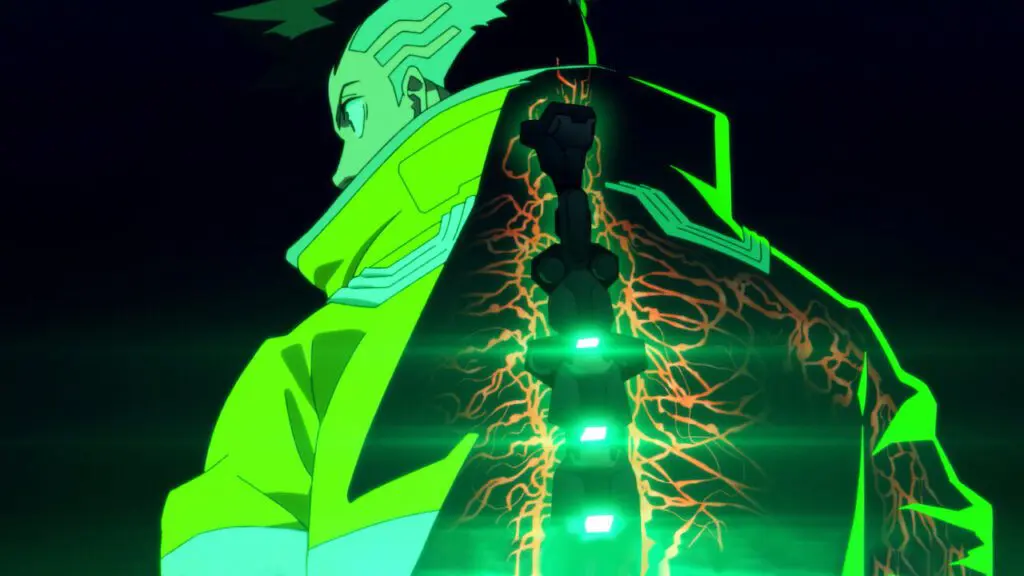Summary
Stylish, idiosyncratic, and infectiously energetic, Cyberpunk: Edgerunners is exactly the kind of story and show this franchise seems designed to accommodate.
Most people associate Cyberpunk 2077 with the most disastrous launch in video game history.
It should have been different. After releasing – and then re-releasing multiple times – their magnum opus, The Witcher 3: Wild Hunt, Polish development studio CD Projekt Red turned their attention to an ambitious open-world RPG set in the world of Mike Pondsmith’s 1988 tabletop role-playing game Cyberpunk 2020.
They had all the goodwill in the world. They had a talented team. But they had also made big promises they couldn’t keep, and when the game was eventually released after several delays, it was such a mess that versions of it had to be pulled from storefronts, and only the few players with a military-grade supercomputer could turn the ray tracing on.
You’d think all of this would make the game’s Netflix spin-off, Rafal Jaki’s Cyberpunk: Edgerunners, a risky proposition. But the show, animated by production studio Trigger, seems to have taken the circumstances as something of a challenge.
This is Cyberpunk as self-indulgent psychedelia, as an answer to all the anarchic, energetic promises made but never kept. It even works as a cheeky joke at the expense of its streaming giant home, going to great lengths to depict a choking arm of capitalism that commodifies every aspect of public and private life and squeezes the breath out of everyday folks with exploitative subscription models and exorbitant fees.
David Martinez and his mother Gloria exist at the bottom of the ladder, swept up with Night City’s other detritus and forever priced out of comfort and safety. It’s no wonder that there’s an appeal in running jobs for the hackers and mercenaries who exist outside of the strict parameters governing everyday folks.
The show’s first twenty minutes are so aggressively miserable that you can’t imagine how anyone wouldn’t leap at any opportunity to better themselves and their circumstances.
Because let’s be frank, Night City is grim. It’s a deeply cynical vision of a society in which the gulf between haves and have-nots is even more extreme than our own reality; in which even the fantasy of standing up to our bullies is destroyed by cybernetic augmentations that mean the richest are now also the strongest, fastest, and most dangerous.
And yet the show, across ten episodes, is not cynical. It’s an idealistic, surprisingly human drama, at times a love story, tempering its bleak worldview with a vibrant sense of romance and sincerity.
It occurred to me while watching that there’s something about this setting that is extremely well-suited to the flamboyant machismo of 80s Shonen anime, those indulgent fights and shootouts, and fighting game-style square-offs and showdowns.
Studio Trigger has done some exceptional work here, depicting the dour undersides of the city with the same kind of idiosyncrasies and imagination as the more overtly stylized action sequences and in-universe indulgences, like “braindances” – someone’s final moments packaged as a snuff film – and augmented killers so awkwardly proportioned and adorned with gizmos that the show veers into body-horror territory. If nothing else, there’s always something to look at.
And these things are worth looking out for. Cyberpunk: Edgerunners is one of those refreshing animations that takes another medium’s visual language and takes genuine pleasure in reworking it for a new format; everything from incidental details to the empowering augmentations and their vaguely horrifying after-effects is treated with care and style, an extension of the show’s themes and ideas rather than simply a flourish.
The bouncing EDM soundtrack might not do as much heavy lifting, but there’s a case to be made that virtually all action scenes in every show should be set to similar rhythms.
The video game adaptation has historically been terrible to an almost impressively consistent degree, but it’s shows like this – and Castlevania, also animated and also on Netflix – that prove there’s something to be said for translating the unique language and cadence of a game to a medium more able to accommodate it, and animation seems to be the ideal format.
Hand-drawn and personalized and able to be contorted in ways live-action wouldn’t allow for, Cyberpunk: Edgerunners doesn’t just capture and deliver what was great about a game so rickety that most people had no choice but to avoid it, but even colors between the lines of a setting and story that were underserved by the technical niggles.
In many ways, this is the Cyberpunk story the Cyberpunk game wanted to tell and couldn’t.




